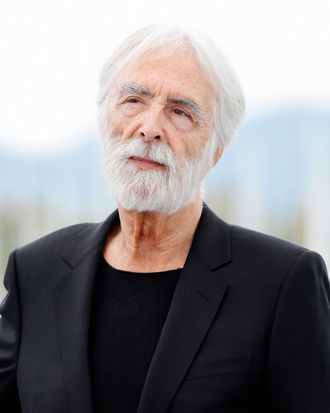
There are certain things you’ve come to expect from most Michael Haneke movies, like a dollop of sadism, an indictment of bourgeois values, and Isabelle Huppert. You’ll get all that and more in Haneke’s new film Happy End, which premiered at the Cannes Film Festival this week, but the movie’s most-buzzed-about inclusion was something you might not expect to find nestled among all those stern scenes from the 75-year-old Austrian auteur behind Amour and Funny Games: a Sia song.
To be fair, Sia has shown up on so many movie soundtracks lately that the law of averages might have eventually guaranteed her presence in a Michael Haneke movie, no matter how unlikely it might seem. The 41-year-old elusive chanteuse could have nearly filled out an entire Best Original Song category last year with her big-screen contributions, penning tunes for Zootopia, Finding Dory, Lion, and The Neon Demon. Most of those songs were meant to add a blast of inspirational power pop to the closing credits, sending the audience out on several of the songstress’s high notes.
That would have been an amusing way for Haneke to use his Sia song, too, but instead the director tapped into the dark undercurrent in Sia’s best-known single, “Chandelier,” and employed it for one of Happy End’s most unsettling scenes. The film follows a well-off French family that includes patriarch (Jean-Louis Trintignant), his daughter (Isabelle Huppert), and son (Mathieu Kassovitz), and their own love interests and children. This clan is so used to papering over problems with money — or, if that won’t solve things, simply looking the other way — that its youngest members seem almost sociopathically soul-sick, including Kassovitz’s secret-keeping daughter (Fantine Harduin) and Huppert’s grown son (Franz Rogowski), who drifts drunkenly from one confrontation to another.
The latter character is the one found singing “Chandelier” in the middle of Happy End, and as a scene opened with Rogowski at a karaoke night starting to burble along to Sia’s massive power chords, the audience laughed. After an hour of vicious politesse, had Haneke decided to leaven things with a moment that nearly any viewer could relate to? After all, who hasn’t attempted a Sia song after a few too many beers at karaoke, or at least sung along to “Chandelier” in the privacy of one’s own home or car?
But Rogowski’s rendition is anything but a triumphant re-creation. Despite the adrenalized pop production of Sia’s big hit, “Chandelier” is, at heart, about a person who’s become inured to feeling after partying too hard, and it’s that troubled core you’re reminded of as a wasted Rogowski embarrasses himself while singing. While slurring the chorus, he flings himself around the small karaoke stage, slamming his body into floors and the wall. “I’m gonna live like tomorrow doesn’t exist,” he bellows into the microphone, and his character is so insulated by wealth that he, too, never has to think about the next day’s consequences, since Huppert will likely swoop in to clean up her wastrel son’s messes. By the end of the song, as Rogowski is practically a soused puddle on the floor, Haneke has pulled off quite the gambit: Somehow, he’s taken this moment of contemporary camp and pulled it into his own bleak world.
You’ve got to give the man some credit: It’s hard to imagine, say, Woody Allen or the Coen brothers ever finding room for a Sia song, let alone including some of the other modern touches Haneke incorporates into Happy End, including several sequences shot in a vertical Instagram Live format, a diversion about a young and edit-happy YouTuber, and a few prolonged Facebook chats about piss play. Don’t get me wrong, Haneke makes those things seem bleak as hell, but it’s impressive that he touches on them at all; while Haneke has always been fascinated by the ways we use technology, he tackles all those cold new screens with the curiosity and familiarity of a much-younger filmmaker. Like his unlikely muse, he loves cheap thrills.

